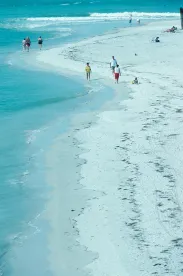On June 17, 2010, the Supreme Court unanimously ruled that the State of Florida did not infringe on private property interests by engaging in a beach preservation effort. But though the participating justices agreed on the decision (Justice Stevens did not participate), they disagreed sharply on a point of constitutional law underlying the complaint.
The decision in Stop the Beach Renourishment, Inc v. Florida Department of Environmental Protection et al., revolved around Florida shoreline property owners' title to land above the mean high water line, which establishes the seaward border of shoreline property in Florida. The complaint arose from a Florida statutory program to restore eroded beaches. The Department of Environmental Protection added material to extend the beach and created a plan to continue replenishing the material in order to preserve the beach. The State of Florida contended that under Florida statutory and common law, the acquisition of title by shoreline owners to what are called accretions applies only when the mean high water line gradually recedes naturally over time. If it recedes suddenly, an event known as an avulsion, then the property line remains at the previous mean high water line. The newly exposed upland seaward of this line continues to belong to the State. When this happens, shoreline or "littoral" property owners do not acquire title either to the newly created upland or to subsequent accretions to the newly created upland.
Under the Florida statute authorizing the restoration, the man-made “avulsions” created by beach replenishment were treated the same as their natural counterparts. As with natural avulsions, the property line stayed at the previous mean high water line. The State thus contended that it owned the newly exposed upland that lay between the seaward border of the private property and the new mean high water line. The State further contended that, as a further consequence, the littoral property owners also did not obtain title to the accretions to the upland created as a result of the avulsion.
A group of property owners objected. In their view, title to accretions was part of their property interest in the land, and Florida's action amounted to an unconstitutional taking. The property owners argued the case to the Florida Supreme Court. When the Florida high court ruled against them, they brought the case before the U.S. Supreme Court, and argued that the actions of the Florida Court constituted a "judicial taking."
Ultimately, the Supreme Court concluded that there could be no taking unless the petitioner could show that, before the Florida Supreme Court’s decision, littoral property owners had rights to further accretions and contact with the water under Florida law that were superior to the State’s right to fill in its submerged land. The Court determined that the Florida court’s decision was consistent with background principles of the State’s property law, and therefore the necessary showing could not be made in this case.
Nevertheless, the circumstances of the case engendered a lively debate between the plurality and the other justices over the issue of whether there could be a “judicial taking” under the Court’s takings jurisprudence. Takings — when the government seizes private property, either by literally taking it for public use, or by acting to destroy part of its value — are a well established concept in property law, but the legislative branch is usually the culprit. The idea that judicial action might also amount to a taking is somewhat novel. But a plurality of the Court, led by Justice Scalia, saw merit in the concept, and opined that judicial takings do indeed exist.
This matter proved more divisive for the court than the actual holding in the case. While all the participating justices agreed that the actions of the State of Florida had not constituted a taking, Justice Scalia could not rally a majority around the concept of judicial taking. His lengthy opinion, joined by Chief Justice Roberts, and Justices Thomas and Alito, makes short work of the Florida matter, but goes on to challenge, point by point, the reservations expressed in the two concurring opinions.
The concurrences, one by Justice Kennedy and joined by Justice Sotomayor, and one by Justice Breyer, joined by Justice Ginsberg, reached the same conclusion as the Scalia plurality on the Florida matter, but differed on the need to establish whether there was a need to decide if there is such a thing as a judicial taking.
Justice Kennedy seemed concerned that establishing the concept of judicial taking would do more to validate such behavior than discourage it, since takings are actually allowed under the Constitution, so long as the property owner receives just compensation. And Justice Breyer defended himself against a harsh attack from Scalia that compared his reasoning with the age old question, “How much wood would a woodchuck chuck if a woodchuck could chuck wood?” This comparison arose from Justice Scalia’s incredulous objection to Justice Breyer’s willingness to declare that the Florida Court did not commit a judicial taking, without feeling the need to define what a judicial taking is, or even confirm that such a thing existed. Justice Breyer responded that the Court had a long tradition of settling only the matter at hand while leaving some of the underlying questions for later.
The "Stop the Beach" decision establishes that, under Florida law, the State’s action to restore and replenish its beaches could not constitute a taking under the Fifth Amendment because it did not deprive littoral property owners of accretion rights or any other property rights recognized under background principles of Florida law. As for judicial takings, without a majority on this issue, this question — along with that of how much wood a woodchuck might chuck — is left for another day.



 />i
/>i

